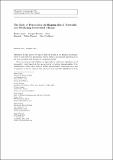| dc.contributor.author | Lepri, Bruno | |
| dc.contributor.author | Staiano, Jacopo | |
| dc.contributor.author | Shmueli, Erez | |
| dc.contributor.author | Pianesi, Fabio | |
| dc.contributor.author | Pentland, Alex Paul | |
| dc.date.accessioned | 2016-06-27T17:10:20Z | |
| dc.date.available | 2017-03-01T16:14:49Z | |
| dc.date.issued | 2016-02 | |
| dc.date.submitted | 2015-08 | |
| dc.identifier.issn | 0924-1868 | |
| dc.identifier.issn | 1573-1391 | |
| dc.identifier.uri | http://hdl.handle.net/1721.1/103358 | |
| dc.description.abstract | In this paper, we exploit different facets of the Friends and Family study to deal with two personality-related tasks of paramount importance for the user modeling and ubiquitous computing fields. First, we propose and validate an approach for automatic classification of personality traits based on the ego-networks’ structural characteristics. Our classification results show that (i) mobile phones-based behavioral data can be superior to survey ones for the purposes of personality classification from structural network properties and (ii) particular feature set/network type combinations promise to perform better with given personality traits. Then, we investigate the mediating role played by personality in the context of inducing behavioral change, specifically increasing daily physical activity using social strategies (social comparison and peer pressure). Our results confirm the role played by Extraversion and Neuroticism. Extroverts exposed to a social comparison strategy are positively associated with an increase in physical activity level, while they tend to decrease physical activity level if they are exposed to a peer pressure intervention strategy. Regarding Neuroticism dimension, neurotic people tend to increase their physical daily activity level if they are exposed to a social comparison strategy. Our findings may have implications in designing personality-based behavioral change strategies and suggest to incorporate users’ personality models in the implementation of persuasive systems. | en_US |
| dc.publisher | Springer Netherlands | en_US |
| dc.relation.isversionof | http://dx.doi.org/10.1007/s11257-016-9173-y | en_US |
| dc.rights | Creative Commons Attribution-Noncommercial-Share Alike | en_US |
| dc.rights.uri | http://creativecommons.org/licenses/by-nc-sa/4.0/ | en_US |
| dc.source | Springer Netherlands | en_US |
| dc.title | The role of personality in shaping social networks and mediating behavioral change | en_US |
| dc.type | Article | en_US |
| dc.identifier.citation | Lepri, Bruno, Jacopo Staiano, Erez Shmueli, Fabio Pianesi, and Alex Pentland. “The Role of Personality in Shaping Social Networks and Mediating Behavioral Change.” User Modeling and User-Adapted Interaction 26, no. 2–3 (February 15, 2016): 143–175. | en_US |
| dc.contributor.department | Massachusetts Institute of Technology. Media Laboratory | en_US |
| dc.contributor.mitauthor | Pentland, Alex Paul | en_US |
| dc.relation.journal | User Modeling and User-Adapted Interaction | en_US |
| dc.eprint.version | Author's final manuscript | en_US |
| dc.type.uri | http://purl.org/eprint/type/JournalArticle | en_US |
| eprint.status | http://purl.org/eprint/status/PeerReviewed | en_US |
| dc.date.updated | 2016-05-23T12:07:27Z | |
| dc.language.rfc3066 | en | |
| dc.rights.holder | Springer Science+Business Media Dordrecht | |
| dspace.orderedauthors | Lepri, Bruno; Staiano, Jacopo; Shmueli, Erez; Pianesi, Fabio; Pentland, Alex | en_US |
| dspace.embargo.terms | N | en |
| dc.identifier.orcid | https://orcid.org/0000-0002-8053-9983 | |
| mit.license | OPEN_ACCESS_POLICY | en_US |
